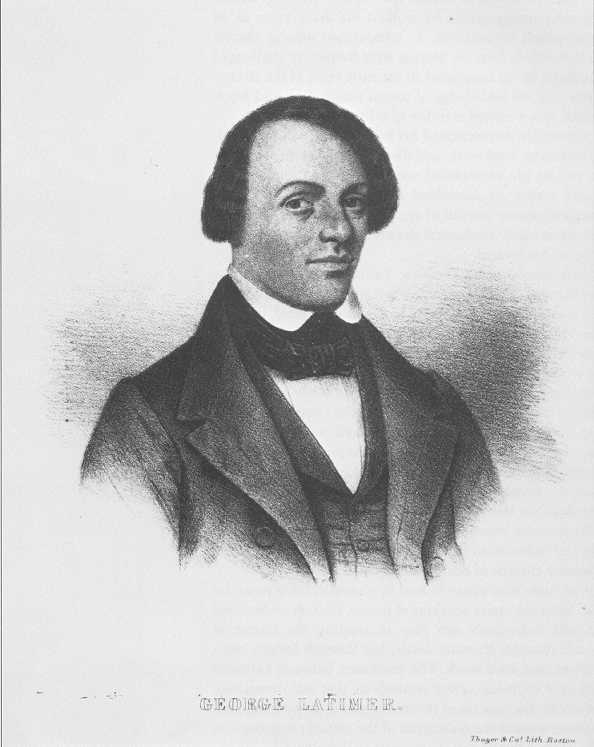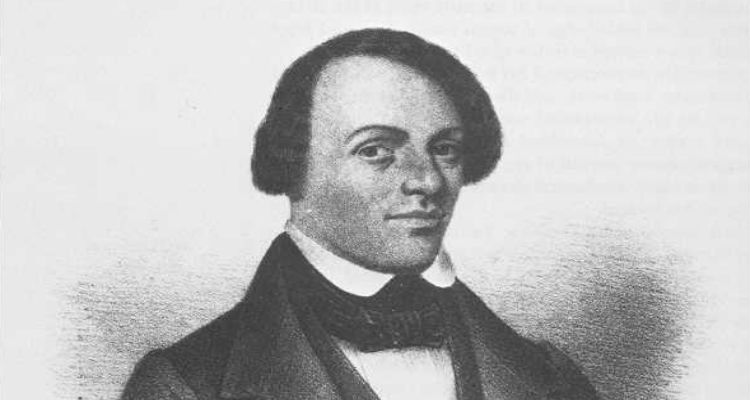George Latimer, the father of inventor Lewis Howard Latimer, was the first fugitive from the Maafa (Atlantic slavery) whose arrest, imprisonment, trial, and emancipation, as well as the numerous public meetings, held all over Massachusetts on his behalf, made him a cause célèbre. His supporters, including, Frederick Douglass, Charles Lenox Remond, and other abolitionists fought round the clock for his freedom and won.
George W. Latimer was born in Norfolk, Virginia on July 4, 1819. His father, Mitchell Latimer, was a whyte man and his mother, Margaret Olmsted, an enslaved woman in bondage to his uncle Edward A. Latimer. In the early part of his life he was enslaved by a man named Edward Mallery, for whom he worked as a domestic servant until the age of sixteen. After that time, his labor was hired out and he primarily worked driving a dray and as a shopkeeper. On two separate occasions he spent time in prison as a result of the debts of his enslaver. He was eventually sold to James B. Gray, a shop owner whose store Latimer manned. He abused Latimer and it is thought that this abuse precipitated Latimer’s flight to Boston.

On October 4, 1842, Latimer and his wife, Rebecca, who was pregnant at the time, ran away. The pair hid beneath the deck of a northbound ship that took them to Baltimore. From there they traveled to Philadelphia, with Rebecca posing as a servant to her lighter-skinned husband. At last, they made their way to Boston, arriving on either October 7 or 8th. Gray offered a reward of $25 if Latimer was captured in Virginia and $50 plus expenses if he was captured outside Virginia.
On the day the couple arrived in Boston, Latimer was recognized by a former employee of Gray. On October 20, Latimer was arrested. The initial charge was larceny. Latimer was brought before Justice Joseph Story, who ordered that he be held.
Latimer’s arrest resulted in an uproar so great that “Boston was, without a doubt, the most potentially violent city in America.” When news of his arrest spread through the Black community, the following day, nearly 300 Black males assembled around the court house “to prevent the [fugitive] from being moved out of the city until word was pledged that Mr. Gray would take no steps not authorized by law.” Abolotionists rallied to his defense, attempting to have him released by a writ of habeas corpus. When this proved unscussessful the abolitionists held a mass meeting at Faneuil Hall, where attendees not only vowed resistance to slave-catching but also voted for disunion. Additional meetings were held throughout the state, called “Latimer Meetings.” The Latimer Meetings were addressed by abolitionists such as Frederick Douglass and Charles Lenox Remond; and the money raised from these meetings was eventually used to purchase Latimer’s freedom.
To coordinate the abolitionist protest a Latimer Committee was appointed, made up of Dr. Henry Bowditch, William Francis Channing, and Frederick Cabot. The trio founded a newspaper called the Latimer Journal and North Star, which first appeared in Boston on November 11, 1842. Its purpose was “to meet the urgency of the first enslavement in Boston” and to rescue a fugitive from the custody in which he was detained. The Latimer Journal reported that the social unrest related to Latimer’s imprisonment was such that “fire and bloodshed threatened in every direction.” Critics claimed that the Latimer Journal “greatly excited and alarmed the credulous, vexed the irritable, inflamed the passionate, and exasperated those whose sympathies ran beyond their judgments.” Six issues appeared subsequently from November 11, 1842 to May 16, 1843, with a circulation of 20,000.
Another committee operation was the promotion of two petitions, one to the state legislature and another to the national legislature. The “Great Massachusetts Petition” requested a law banning the involvement of state officials or public property in the detention or arrest of suspected fugitives. The “Great Petition to Congress” demanded that laws or amendments be passed severing any connection between Massachusetts and the Maafa.
Gray, surprised by the depth of feeling which the case aroused throughout New England and fearful of the counter-charges launched by Latimer’s legal advisers, decided to sell him for $400. The abolitionist highly pleased at this turn of events, did not abandon their petition drive. By mid-February 1843, the two petitions were delivered to their respective destinations. The petition delivered to the State Assembly contained 64,526 signatures and weighed 150 pounds by the time it was delivered on February 17, 1843. Five weeks later the legislature passed a measure dubbed the Latimer Law, the 1843 Personal Liberty Act. The act prevented Massachusetts officials from assisting in the detention of suspected fugitives and banned the use of state facilities to detain such suspects.
After his freedom was purchased, George Latimer remained involved in the abolitionist cause, attending anti-slavery conventions and helping to gather signatures for the two petitions that were started while he was imprisoned.
There is not a great deal of information available about Latimer’s life as a free man. He continued to be involved in, and connected to, the abolitionist movement. In 1851 he was involved in the rescue of an escaped enslaved man, Shadrach Minkins, when he was paid to keep Minkins’s owner under surveillance.
Latimer’s primary occupation was as a paperhanger and he worked in this capacity for forty-five years in Lynn, Massachusetts. The first of the Latimers’ four children was born shortly after his freedom was purchased. The youngest, Lewis Howard Latimer, who was born in 1848, went on to become a famous inventor.
Source:
Black Abolitionists by Benjamin Quarles
https://en.wikipedia.org/wiki/George_Latimer_(escaped_slave)
http://edison.rutgers.edu/latimer/glatcase.htm



